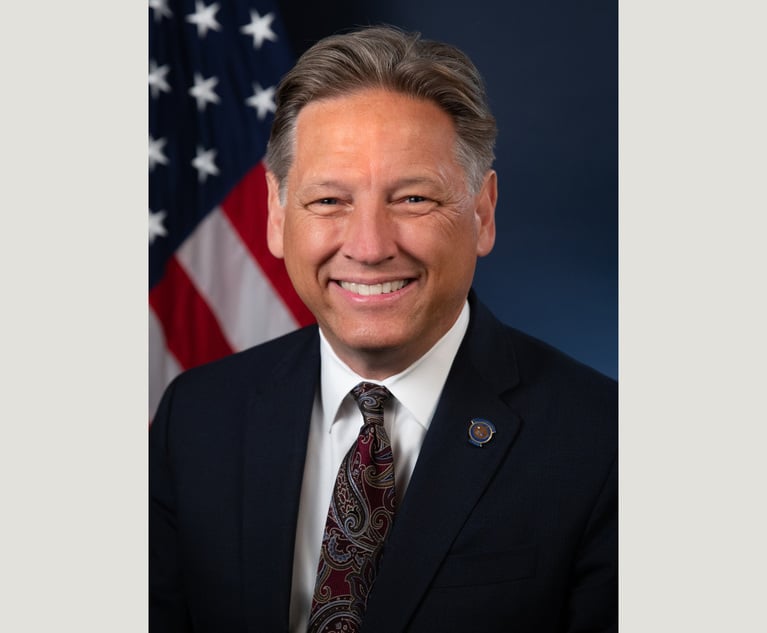'Prosecutor's Office Hid Key Evidence': Orange County Judge Overturns Murder Conviction in Ongoing Jail Informant Scandal
Todd Spitzer, the current elected Orange County district attorney, said prosecutors "have confidence in the facts that resulted in the defendant's 2010 murder conviction."
August 10, 2021 at 11:54 AM
6 minute read
 Scott Sanders, an assistant public defender in Orange County, California, speaks outside the courthouse Aug. 9. 2021. Photo: Meghann M. Cuniff/ALM
Scott Sanders, an assistant public defender in Orange County, California, speaks outside the courthouse Aug. 9. 2021. Photo: Meghann M. Cuniff/ALM
Amid new revelations about a years-long scandal involving jail informants, a California state judge on Monday overturned the murder conviction of a man who's been in custody for 12 years.
The Orange County District Attorney's Office requested the new trial as a judge was to begin an evidentiary hearing into whether prosecutors and the sheriff's office violated Paul Gentile Smith's constitutional rights by failing to tell his defense attorneys that a trained informant had targeted him in jail to elicit incriminating statements from him.
Orange County Superior Court Judge Patrick Donahue vacated Smith's murder conviction Monday and scheduled an arraignment for Friday. For him, there wasn't much to do: "The people agree and concede there should be a new trial in this," he said.
The judge first learned Aug. 5, which was to be the first day of the evidentiary hearing, that prosecutors would be requesting the new trial, because some Orange County Sheriff's Department deputies planned to invoke their Fifth Amendment right against self-incrimination, rather than testify about their work with informants.
Todd Spitzer, the current elected Orange County district attorney, said prosecutors "have confidence in the facts that resulted in the defendant's 2010 murder conviction."
"Irrespective, we had no choice but to concede a new trial as a result of a failure by the prior District Attorney administration to provide proper discovery to the defense in addition to the recent revelation that Orange County Sheriff's deputies and investigators would refuse to testify," according to a statement released through his spokeswoman.
Uncovered: Illegal Use of Informants
 Orange County Superior Court's Central Justice Center in Santa Ana, California. Photo: Meghann M. Cuniff/ALM
Orange County Superior Court's Central Justice Center in Santa Ana, California. Photo: Meghann M. Cuniff/ALM Overturning a murder conviction is unusual but also somewhat common nationally with the rise of DNA testing and dedicated work from legal groups such as the Innocence Project.
But in Orange County, the sixth-most populous county in the nation, cases have been dismantled over the last several years, because of an unprecedented discovery by defense attorneys that law enforcement had for years been using informants illegally inside the jail through an organized effort that was never disclosed to defense attorneys or to the juries that heard the cases.
The U.S. Department of Justice has had an active civil pattern-or-practice investigation in Orange County since 2016.
A report released by the District Attorney's Office in July 2020 concluded prosecutors committed malpractice, and it detailed a years-long effort by the office to systematically withhold evidence from defense counsel.
The report followed years of public denials, including during high-profile litigation that led a judge in 2017 to throw out the death penalty against the county's deadliest mass murderer, Scott Dekraai, and instead sentence him to life in prison for murdering eight people in 2011.
The Orange County public defenders who represented Dekraai, Scott Sanders and Sara Ross had since 2014 been finding evidence of other defendants who'd been targeted by informants, including Smith, whose conviction Donahue tossed Monday.
With Dekraai's case unfolding, prosecutors first disclosed to Smith's counsel in 2016 that multiple informants had targeted him while he was in jail awaiting trial.
Jurors heard from one informant during the trial, but they weren't told he was working with law enforcement, or that there were others who targeted Smith, too. Sanders and Ross took over representing him in 2019, and have been pursuing a new trial through a writ of habeas corpus.
"The bottom line is the sheriff's department and prosecutor's office hid key evidence that three informants had been working illegally to get statements from our client Mr. Smith," Sanders said after court Monday.
Sanders said Smith's case is particularly relevant to the ongoing DOJ investigation because "it implicated a high-ranking prosecutor and it demonstrated an enormous quantity of withheld evidence by the sheriff's office."
Sanders was referring to Ebrahim Baytieh, a senior assistant district attorney and candidate for Orange County Superior Court judge. He has not spoken publicly about the issue, but his boss, Spitzer, alluded to wrongdoing on his part by saying, "It's indisputable that an interview of an informant related to this defendant existed and was in the possession of the Orange County Sheriff's Department. It is also indisputable that the prosecutor had a duty to discover that to the defense."
"There are numerous references throughout the investigation that this individual was also an informant. Another informant also referred to this first informant repeatedly when investigators interviewed him," according to Spitzer's statement, which his spokeswoman issued Aug. 6.
Sanders said he and Ross "have been contending now for several years, I think quite correctly, that he withheld this evidence. Mr. Spitzer now seems to be indicating as recently as Friday that he agrees, that Mr. Baytieh was the person responsible for withholding that evidence," Sanders said, noting that Baytieh "was one of the principal deniers of the informant scandal" who often publicly denounced any allegations of wrongdoing involving informants.
Spitzer beat his longtime political rival, Tony Rackauckas, for the District Attorney's Office in the 2018 election in a campaign that focused on the informant scandal and Spitzer's promises to sort through the misconduct. But Spitzer has repeatedly criticized Sanders' ongoing litigation tactics regarding evidentiary scandals with the sheriff's department and his office, and family members of Dekraai's victims have criticized him for not better addressing the prosecutors involved in the scandal.
In the Aug. 6 statement, Spitzer reiterated his commitment to change.
"My prosecutors will not offer up jailhouse informants in any court proceedings without my express approval, a policy I adopted when I became the elected district attorney in 2019," Spitzer said. "The integrity of the criminal justice system is protected when the rights of everyone are protected. The decision to concede a new murder trial in People v. Smith is another crucial step in restoring that integrity."
This content has been archived. It is available through our partners, LexisNexis® and Bloomberg Law.
To view this content, please continue to their sites.
Not a Lexis Subscriber?
Subscribe Now
Not a Bloomberg Law Subscriber?
Subscribe Now
NOT FOR REPRINT
© 2025 ALM Global, LLC, All Rights Reserved. Request academic re-use from www.copyright.com. All other uses, submit a request to [email protected]. For more information visit Asset & Logo Licensing.
You Might Like
View All
California Supreme Court Vacates Murder Conviction in Infant Abuse Case
5 minute read
Biden commutes sentences for 37 of 40 federal death row inmates, including two convicted of California murders
6 minute readTrending Stories
Who Got The Work
J. Brugh Lower of Gibbons has entered an appearance for industrial equipment supplier Devco Corporation in a pending trademark infringement lawsuit. The suit, accusing the defendant of selling knock-off Graco products, was filed Dec. 18 in New Jersey District Court by Rivkin Radler on behalf of Graco Inc. and Graco Minnesota. The case, assigned to U.S. District Judge Zahid N. Quraishi, is 3:24-cv-11294, Graco Inc. et al v. Devco Corporation.
Who Got The Work
Rebecca Maller-Stein and Kent A. Yalowitz of Arnold & Porter Kaye Scholer have entered their appearances for Hanaco Venture Capital and its executives, Lior Prosor and David Frankel, in a pending securities lawsuit. The action, filed on Dec. 24 in New York Southern District Court by Zell, Aron & Co. on behalf of Goldeneye Advisors, accuses the defendants of negligently and fraudulently managing the plaintiff's $1 million investment. The case, assigned to U.S. District Judge Vernon S. Broderick, is 1:24-cv-09918, Goldeneye Advisors, LLC v. Hanaco Venture Capital, Ltd. et al.
Who Got The Work
Attorneys from A&O Shearman has stepped in as defense counsel for Toronto-Dominion Bank and other defendants in a pending securities class action. The suit, filed Dec. 11 in New York Southern District Court by Bleichmar Fonti & Auld, accuses the defendants of concealing the bank's 'pervasive' deficiencies in regards to its compliance with the Bank Secrecy Act and the quality of its anti-money laundering controls. The case, assigned to U.S. District Judge Arun Subramanian, is 1:24-cv-09445, Gonzalez v. The Toronto-Dominion Bank et al.
Who Got The Work
Crown Castle International, a Pennsylvania company providing shared communications infrastructure, has turned to Luke D. Wolf of Gordon Rees Scully Mansukhani to fend off a pending breach-of-contract lawsuit. The court action, filed Nov. 25 in Michigan Eastern District Court by Hooper Hathaway PC on behalf of The Town Residences LLC, accuses Crown Castle of failing to transfer approximately $30,000 in utility payments from T-Mobile in breach of a roof-top lease and assignment agreement. The case, assigned to U.S. District Judge Susan K. Declercq, is 2:24-cv-13131, The Town Residences LLC v. T-Mobile US, Inc. et al.
Who Got The Work
Wilfred P. Coronato and Daniel M. Schwartz of McCarter & English have stepped in as defense counsel to Electrolux Home Products Inc. in a pending product liability lawsuit. The court action, filed Nov. 26 in New York Eastern District Court by Poulos Lopiccolo PC and Nagel Rice LLP on behalf of David Stern, alleges that the defendant's refrigerators’ drawers and shelving repeatedly break and fall apart within months after purchase. The case, assigned to U.S. District Judge Joan M. Azrack, is 2:24-cv-08204, Stern v. Electrolux Home Products, Inc.
Featured Firms
Law Offices of Gary Martin Hays & Associates, P.C.
(470) 294-1674
Law Offices of Mark E. Salomone
(857) 444-6468
Smith & Hassler
(713) 739-1250








